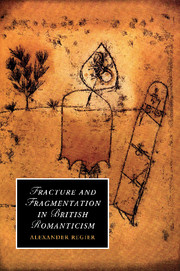Book contents
- Frontmatter
- Contents
- Acknowledgements
- List of abbreviations
- Broken origins: an introduction
- 1 A brotherhood is broken: Babel and the fragmentation of language
- 2 Figuring it out: the origin of language and anthropomorphism
- 3 Forces trembling underneath: the Lisbon earthquake and the sublime
- 4 A blue chasm: Wordsworth's The Prelude and the figure of parenthesis
- 5 Letters from the grave: John Keats's fragmented corpus
- 6 The doubling force of citation: De Quincey's Wordsworthian archive
- 7 Philological fractures: Paul de Man's Romantic rhetoric
- Notes
- Bibliography
- Index
- CAMBRIDGE STUDIES IN ROMANTICISM
3 - Forces trembling underneath: the Lisbon earthquake and the sublime
Published online by Cambridge University Press: 06 July 2010
- Frontmatter
- Contents
- Acknowledgements
- List of abbreviations
- Broken origins: an introduction
- 1 A brotherhood is broken: Babel and the fragmentation of language
- 2 Figuring it out: the origin of language and anthropomorphism
- 3 Forces trembling underneath: the Lisbon earthquake and the sublime
- 4 A blue chasm: Wordsworth's The Prelude and the figure of parenthesis
- 5 Letters from the grave: John Keats's fragmented corpus
- 6 The doubling force of citation: De Quincey's Wordsworthian archive
- 7 Philological fractures: Paul de Man's Romantic rhetoric
- Notes
- Bibliography
- Index
- CAMBRIDGE STUDIES IN ROMANTICISM
Summary
‘Have you heard of the earthquake in Lisbon?’
THE PROGRESSIVIST NARRATIVE
In the opening book of his autobiography, Dichtung und Wahrheit (1811–32), Goethe records one of his most important childhood experiences by taking a distancing look at himself in the third person:
[T]he boy's tranquillity of mind was deeply shaken for the first time by an extraordinary event. On the first of November, 1755, occurred the great earthquake of Lisbon, spreading enormous terror over a world grown accustomed to peace and quiet.
Just as this date shakes and severs Goethe's biography, the tremendous impact of the earthquake of Lisbon is a defining moment for the entire century. In what follows, I want to take seriously Goethe's image of the disruptive power of this well-known disaster. The argument of this third chapter presents the Lisbon earthquake as an event whose metaphorical force provides a conceptual springboard for a reading of some central texts on the sublime. Although my point of departure is the material circumstance of 1755, its role in these readings is primarily that of conceptual and rhetorical catalyst.
The earthquake of Lisbon has captured the imagination of people throughout the centuries in many ways. In recent times we have become familiar with the journalistic strategy of linking disastrous events such as 9/11 or the Asian tsunami in 2004 with the eighteenth-century disaster.
- Type
- Chapter
- Information
- Fracture and Fragmentation in British Romanticism , pp. 75 - 94Publisher: Cambridge University PressPrint publication year: 2010

